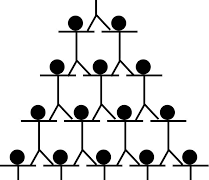Whether you are enthusiastic about the creative use of prosthetics in gruesome scenes, or you find yourself hooked by the experience of jumping behind your sofa in fear, some of us are simply drawn to horror films. It’s not surprising to say that those who enjoy a nail-biting plot full of jump scares and transcendent creatures tend to be more imaginative and more likely to believe in the paranormal [2]. Imagination is essential to the enjoyment of horror since the ability to daydream allows you to empathise more easily with the emotions and cognitions of characters in the movie and become more immersed in the film. People who enjoy horror films are also more likely to be avid sensation-seekers. Generally, men tend to be more sensation-seeking than women [6]; does this predispose men to the enjoyment of horror films?
Distress response to horror films was correlated positively with delight in male participants but was non-significant in women [5], indicating that men may be more inclined to like horror content than women. However, gender stereotyping may also play a role in our perception of horror film enjoyment in the opposite sex; when asked to compare enjoyment and fright response to horror films, women tend to overestimate male enjoyment whilst men tend to overestimate fright response in women [6].
Despite knowing that we will be overanalysing that creaking floorboard for hours afterwards, we still subject ourselves to the suspense of scary movies. So what motivates us?
People who are motivated to watch horror films can be classified in to two broad categories – those who are gore seekers and those who are thrill seekers. Interestingly, thrill seekers tend to enjoy more traditional endings, when all loose ends are tied up and the ‘bad guy’ is apprehended. Thrill seekers also watch horror films for the adrenaline rush they experience when shocking events occur. On the other hand, gore seekers prefer cliff-hangers and are more responsive to the destructive nature of horror [2]. Linked to this dichotomy in motivation for horror viewing, there are also sex differences in viewing motivation, with men being significantly more likely to view horror films with gore seeking motives whilst women are more likely to enjoy horror content with thrill related motives [6].
We now know about sex differences in enjoyment of horror; does personality have anything to say about who likes scary films?
Those who have a tendency to enjoy and openly engage in emotional experiences (also known as Need for Affect, NFA) may be at a loss here, as they are more likely to experience and perceive emotions from horror films as negative [1]. Also, research suggests that are connections between the Big 5 personality traits and horror film enjoyment:
Extraversion -Greater frequency of watching horror films, finding horror films more enjoyable, and finding horror films more frightening when watched with others.
Neuroticism – More easily scared during film, and more frightened after watching horror films.
Agreeableness – Easily scared by horror media, enjoyment of watching horror with others, less likely to think horror films are scarier with others.
Conscientiousness – Less scared after watching horror compared with those low in conscientiousness.
Imagination/Intellect – Greater enjoyment of horror, easily scared by horror content, more frequent horror watching, and preference for thrill-related content .
To summarise, watching and enjoying scary films seems to be linked with more outgoing social traits. Whereas those scoring high in emotional sensitivity or neuroticism may find horror content unpleasantly arousing. Of the Big 5 personality traits, imagination/intellect is most indicative of enjoyment and frequency of horror movie consumption. Whether you are a fan of human dissection or the heart palpitations resulted from having a good fright, it appears that watching horror films is a great way of fulfilling that sensation-seeking need!
Contribution by Leanne Jackson, PhD Psychology student at the University of Liverpool.
References
[1] Bartsch, A, Appel, M, & Storch, D (2010). Predicting emotions and meta-emotions at the movies: the role of the need for affect in audiences’ experience of horror and drama. Communication research, 37(2), 167-190, Doi: 10.1177/009365020356441 [2] Clasen, M, Kjeldgaard-Christiansen, J., & Johnson, J. A. (2018). Horror, personality, and threat simulation: a survey on the psychology of scary media. Evolutionary behavioural sciences. Advance online publication.[3] King, C M, & Hourani (2007). Don’t tease me: effects of ending type on horror film enjoyment. Media psychology, 9(3), 473-492
[4] Mundorf, N, Weaver, J, & Zillmann, D (1989). Effects of gender roles and self perceptions on affective reactions to horror films. Sex roles, 20(11/12), 655-673 [5] Sparks, G G (1991). The relationship between distress and delight in males’ and females’ reactions to frightening films. Human communication research, 17(4), 625-637 [6] Tamborini, R, Stiff, J (1987). Predictors of horror film attendance and appeal: an analysis of the audience for frightening films. Communication research, 14(4), 415-436




